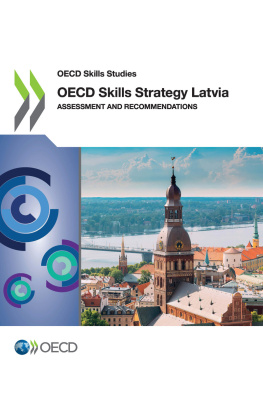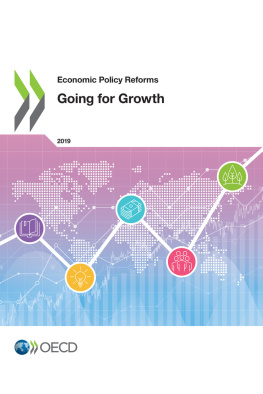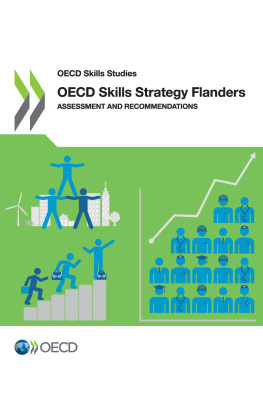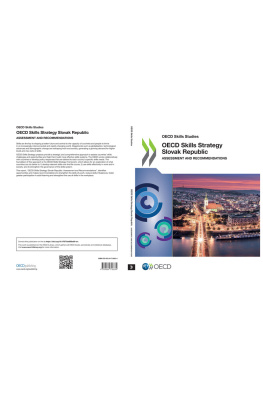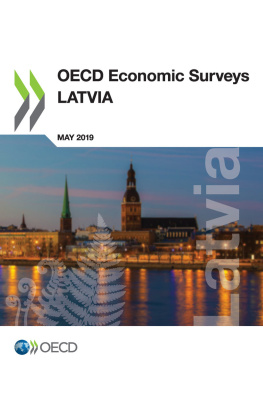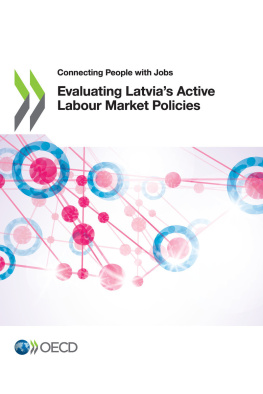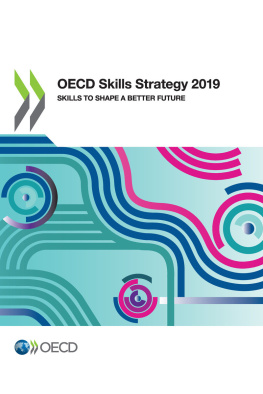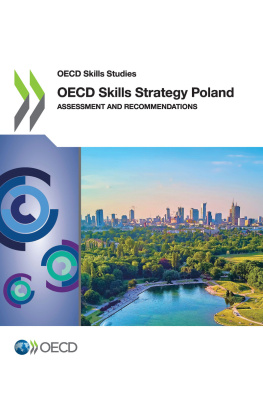OECD - OECD Skills Strategy Latvia
Here you can read online OECD - OECD Skills Strategy Latvia full text of the book (entire story) in english for free. Download pdf and epub, get meaning, cover and reviews about this ebook. year: 2019, publisher: OECD Publishing, genre: Politics. Description of the work, (preface) as well as reviews are available. Best literature library LitArk.com created for fans of good reading and offers a wide selection of genres:
Romance novel
Science fiction
Adventure
Detective
Science
History
Home and family
Prose
Art
Politics
Computer
Non-fiction
Religion
Business
Children
Humor
Choose a favorite category and find really read worthwhile books. Enjoy immersion in the world of imagination, feel the emotions of the characters or learn something new for yourself, make an fascinating discovery.
OECD Skills Strategy Latvia: summary, description and annotation
We offer to read an annotation, description, summary or preface (depends on what the author of the book "OECD Skills Strategy Latvia" wrote himself). If you haven't found the necessary information about the book — write in the comments, we will try to find it.
OECD: author's other books
Who wrote OECD Skills Strategy Latvia? Find out the surname, the name of the author of the book and a list of all author's works by series.
OECD Skills Strategy Latvia — read online for free the complete book (whole text) full work
Below is the text of the book, divided by pages. System saving the place of the last page read, allows you to conveniently read the book "OECD Skills Strategy Latvia" online for free, without having to search again every time where you left off. Put a bookmark, and you can go to the page where you finished reading at any time.
Font size:
Interval:
Bookmark:
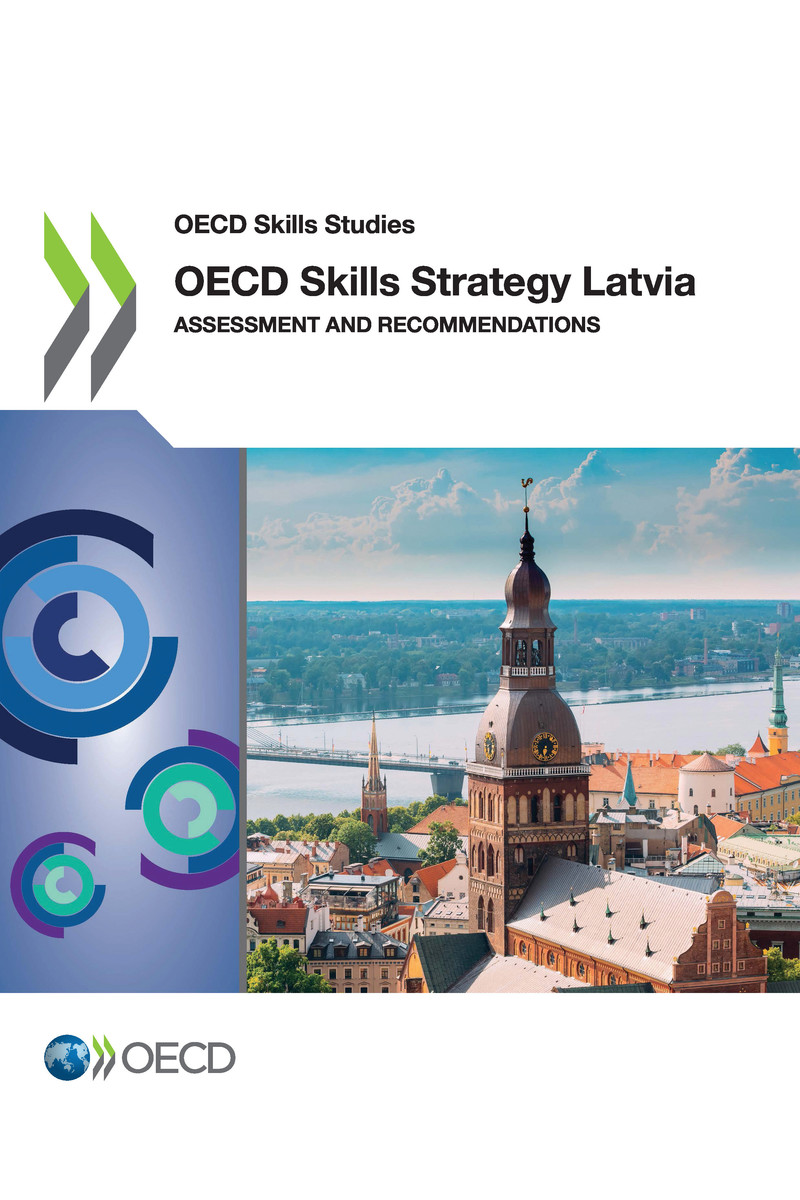
OECD (2019), OECD Skills Strategy Latvia: Assessment and Recommendations , OECD Skills Studies, OECD Publishing, Paris, https://doi.org/10.1787/74fe3bf8-en .
The information in this document with reference to Cyprus relates to the southern part of the Island. There is no single authority representing both Turkish and Greek Cypriot people on the Island. Turkey recognises the Turkish Republic of Northern Cyprus (TRNC). Until a lasting and equitable solution is found within the context of the United Nations, Turkey shall preserve its position concerning the Cyprus issue.
The Republic of Cyprus is recognised by all members of the United Nations with the exception of Turkey. The information in this document relates to the area under the effective control of the Government of the Republic of Cyprus.
Peoples skills are at the heart of Latvias vision for the future.
As globalisation and digitalisation transform jobs, how societies function and how people interact, the impetus for getting skills right is growing. People will need higher levels of skills and a well-rounded set of skills, including cognitive, social and emotional, and job-specific skills, to flourish in life both in and out of work.
After a severe recession, Latvias economy is now in an upswing, with GDP growth above 4% in 2018. To solidify its recovery and prepare its people for the uncertainties of the future, Latvia is making significant investments in skills. It already performs well compared to most OECD countries on many measures of skills development and use. Student performance in developing skills is around the OECD average, and the association between socio-economic status and education performance is weaker than the OECD average. The share of adults who are unmotivated to participate in adult learning is below average. Furthermore, the unemployment rate has nearly returned to pre-recession levels. Various bodies are in place to support whole-of-government co-ordination and stakeholder engagement on skills issues.
However, some challenges remain. The skills of the ageing teaching workforce need to be updated. Sustainable funding mechanisms and broader funding sources for adult learning are required so that Latvia can rely less heavily on European Structural Funds. Improving wages and working conditions for high- demand occupations could reduce the emigration of highly educated workers from Latvia. Partnerships between government and social partners need to be strengthened, which would raise capacity to implement and monitor innovative and coherent skills policies.
Recent and planned policy reforms show great promise, but more needs to be done to ensure better skills outcomes. The government and all relevant stakeholders should continue to work in partnerships that involve every level of government, education and training providers, employers, trade unions, the non- profit sector, and individual learners.
Citizens of all ages and backgrounds should be able to develop and use their skills effectively to take up the opportunities of a rapidly changing society. Achieving this aim will require concrete steps taken not only by government, but by stakeholders as well.
Based on analysis of Latvias comparative skills performance, as well as the findings from widespread engagement with stakeholders in Latvia, the OECD has developed a number of concrete recommendations to help Latvia along this path.
The OECD stands ready to support Latvia as it seeks to implement better skills policies for better lives.
This report is part of a series of country projects within the OECD programme of work on Building Effective National Skills Strategies.
The OECD is grateful to the Latvian National Project Team for its invaluable guidance and input throughout the project, and its help in convening and organising stakeholder workshops. We are particularly grateful to the National Project Leader, Gunta Arja, and the National Project Co-ordinator, Jeena Muhina, both from the Latvian Ministry of Education and Science, for their strong leadership and co-ordination of the National Project Team, which included: Elina Petrovska (Cross-Sectoral Co-ordination Centre); Gatis Silovs and Jnis Salmi (Ministry of Economics); Inese Stepia and Ruta Porniece (Latvian Employers Confederation); Inga Vanaga (Latvian Trade Union of Education and Science Employees); Linda Romele (Free Trade Union Confederation of Latvia); Raimonds Brdaks (Ministry of Welfare). The National Project support included: Larisa Peka, Inta Jaunzeme, Lelde Zemberga, Laura Vikere, Viktors Kravenko, Guntis Meisters (Ministry Education and Science); aisana akirova (National Centre for Education); Jana Veinberga and Dace Saleniece (State Education Quality Service).
The OECD team wishes to thank current Minister of Education and Science, Ilga uplinska, and former Minister of Education and Science Krlis adurskis for their commitment to this project. We are grateful to State Secretary Liga Lejia from the Ministry of Education and Science for her strategic guidance in this project. We also thank Laura Treimane, Counsellor for Education and Science at the Permanent Representation of the Latvian Government to the OECD, for her insightful advice and continuous support during the project.
Our warm thanks go to the many representatives of ministries, government agencies, education and training institutions, businesses and business associations, unions and community associations, think tanks and other organisations, and adult learners who generously shared their insights during focus groups and bilateral interviews with the OECD team in Riga, and for their written input and good practices. During the missions, the OECD team met around 500 stakeholders representing different sectors and institutions, including practitioners and experts from all levels of education, policy makers, employers, trade unions, local authorities, education and labour market researchers. We would also like to take the opportunity to thank the staff of the Ministry of Education and Science for their excellent organisation of the stakeholder workshops and for their hospitality in hosting these events. We also thank the experts that supported the national project team and the moderators and note-takers in the workshop, whose names are featured in Annex A.
Font size:
Interval:
Bookmark:
Similar books «OECD Skills Strategy Latvia»
Look at similar books to OECD Skills Strategy Latvia. We have selected literature similar in name and meaning in the hope of providing readers with more options to find new, interesting, not yet read works.
Discussion, reviews of the book OECD Skills Strategy Latvia and just readers' own opinions. Leave your comments, write what you think about the work, its meaning or the main characters. Specify what exactly you liked and what you didn't like, and why you think so.

